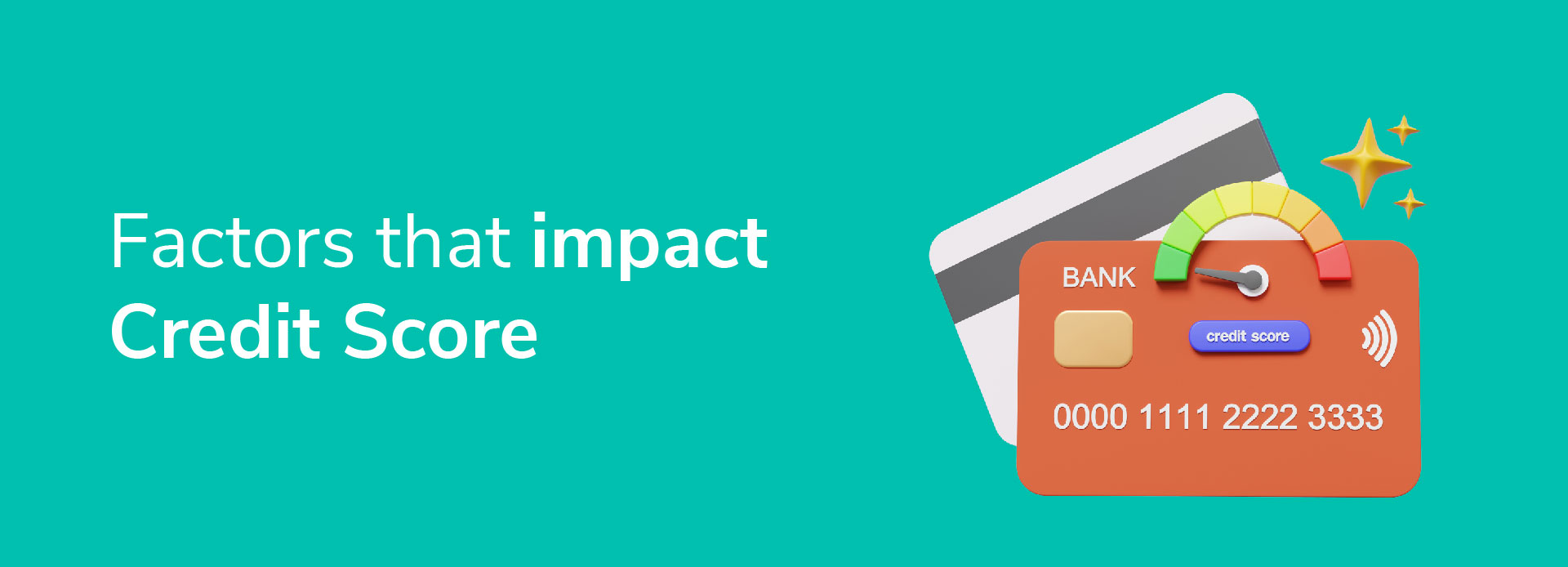
Factors Impacting Credit Score
11 March 2024 | By INDIE
In today's financial landscape, whether you are a professional or a businessperson, applying for credit is simple. Numerous banks and financial institutions offer a wide range of loans and credit cards to take care of your financial requirements. Though the application process seems straightforward, your creditworthiness is assessed by financial institutions via a 3-digit numerical score - the credit score.
A credit score summarizes your credit history and your ability to repay borrowed funds. While applying for a credit card or a personal loan to tackle an emergency, your credit score impacts the loan terms and approval odds. This makes it important to understand how credit score is calculated, along with the factors affecting your credit score.
The Importance of a Good Credit Score
In India, 4 credit bureaus operate under the guidelines of the Reserve Bank of India (RBI) - TransUnion Credit Information Bureau (India) Limited (CIBIL), Equifax, Experian and CRIF High Mark. Your credit score can range from 300 to 900 and a score above 750 is considered good. It is important to have a good credit score due to the following reasons:
It helps generate trust with financial lenders. They view you as a less-risky borrower and are assured you will repay the dues on time.
It increases your chance of securing loans at low interest rates and flexible loan terms. You can explore INDIE My Credit Line for instant access to funds with a repayment schedule that is best suited for you.
It provides a personal line of credit with competitive interest rates, enabling users to manage their finances effectively and improve their credit scores. How Is Credit Score Calculated?
To improve your financial standing and secure better loan terms, you must understand how is credit score calculated. Every bureau uses scoring models and complex algorithms that are updated regularly, to assess your creditworthiness. Listed below are the factors that impact the credit score calculation.
Repayment track record: Credit rating bureaus assign approximately 35% weightage to this factor while calculating your credit score. It indicates your ability to clear your debts on time. Any discrepancy like a default or late payment can hurt your score.
Credit utilization ratio: This ratio measures the credit used in comparison to the total credit available. Around 30% weightage is assigned to this factor while calculating your score. The total outstanding credit balances are divided by the total credit limits to arrive at the ratio. A high credit utilization ratio might impact your score negatively and vice versa.
Also Read: Personal Loan vs Credit Line: Which one is best for you?
Credit history: Having credit cards and accounts open for a long period contributes to a good credit score. It demonstrates responsible credit management over the years, which impacts your score positively. About 10% of weightage is allocated to this factor.
Diverse credit mix: Opt for a diverse mix of credit such as credit cards, personal loans, credit lines, etc., to improve your score. It indicates that you can manage different types of credit responsibly. Approximately 10% weightage is assigned to this factor.
Applying for new credit: This factor is often neglected; however, around 10% weightage is allocated to it. Applying for new credit creates credit inquiries under your name. Making a lot of credit inquiries in a short span is considered a red flag by lenders and could harm your credit score.
Factors Affecting Your Credit Score
1. Irresponsible repayments
While opting for credit facilities, you must ensure that you pay your monthly payments on time. You can automate your payments or set reminders to avoid missing out on the due dates. Delayed or missed payments can impact your credit score negatively.
2. Minimum amount payments
Your credit card statement has a term called 'minimum amount due'. You can pay this amount towards your credit card’s outstanding principal to avoid incurring interest. However, paying only this amount leads to interest compounding on the outstanding balance that gets rolled over. To avoid plunging into a debt trap, always pay your entire credit card dues on time.
3. High utilization of credit
A credit card might offer you a high credit limit, for example, ₹6 lakh. However, a rule to be followed here is to avoid using more than 30% of this limit in any month. Utilizing beyond 50% of your limit and having a huge credit exposure is a cause of concern for lenders.
4. Outstanding debt and errors
Outstanding debts reflect your repayment behavior. Late / missed payments or defaulting on loans can pull down your credit score.
You must examine your credit report regularly. This will help you identify any errors that can be reported to the lenders immediately. For instance, a closed loan might appear active and indicate missed payments. This could negatively impact your credit score.
You must also keep track of your credit enquiries and ensure you do not have multiple inquiries within a short period.
Conclusion
Credit score plays an important role in determining your creditworthiness. To maintain a positive and good credit score, you must understand the factors affecting your credit score and how is a credit score calculated. This will not only help you manage your credit score but also help achieve your financial goals. INDIE's credit line offers a practical and effective solution for individuals seeking to maintain their credit score. By providing a flexible and accessible credit option, it enables users to build a positive credit history through responsible borrowing and timely repayments. Apply now!





